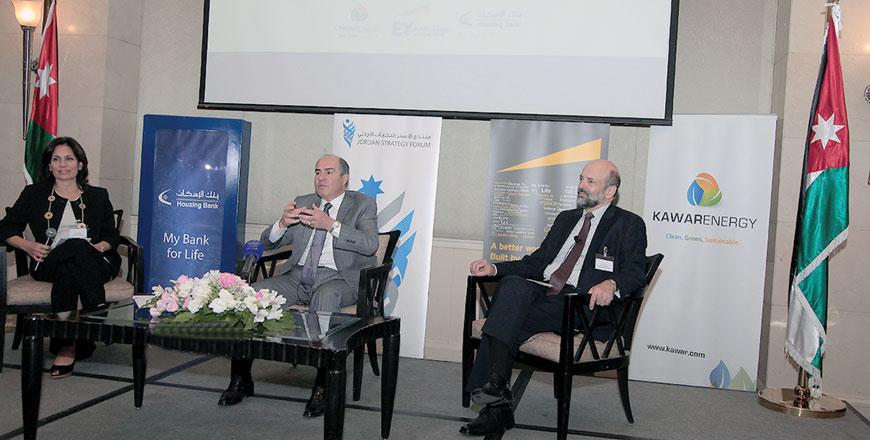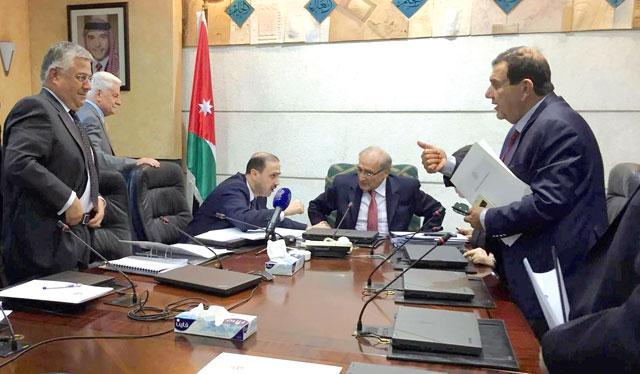You are here
Gov’t receiving ‘positive signals’ from donors after IMF deal
By JT - Jul 05,2016 - Last updated at Jul 05,2016

Prime Minister Hani Mulki (centre) speaks at Jordan Strategy Forum in Amman on Monday (Petra photo)
AMMAN — Jordan is receiving “positive signals” from donors after it has managed to trim expenditures by JD169 million this year, under a deal with the International Monetary Fund (IMF), Prime Minister Hani Mulki said on Monday.
In this regard, Mulki expected Jordan and the European Union to sign an agreement on simplifying the rules of origin for the Jordanian exports to Europe in the second half of this month, the Jordan News Agency, Petra, reported.
The premier made these remarks while participating in a dialogue session organised by the Jordan Strategy Forum in the presence of some ministers, 100 figures representing the forum, businessmen and economists.
The request that the EU loosen its trade restrictions was during the February donor conference in London, when international players pledged to help Jordan overcome the burdens ensuing from the refugee influx.
Reaching a deal with the IMF was a milestone for Jordan, officials have said, because donors were waiting for this development to start their assistance to the Kingdom.
The 2016-2019 programme with IMF aims at confronting the challenges of low economic growth, high unemployment rates, high public debt rates compared to the gross domestic product and the widening budget deficit.
The government has made a series of decisions to generate revenues, including raising the price of cigarettes by 50 fils a packet and 100 fils a packet in Aqaba, which is a duty-free zone.
The government also decided to scrap a Cabinet decision taken last August under which sales tax on clothes, bags, watches, perfume, jewellery, toys and cosmetics was reduced from 16 to 8 per cent, while the customs duties on these items were lowered by between 5 and 30 per cent.
The government also decided to raise the special tax on liquor from JD3.75 a litre to JD5.5 a litre; add a fixed charge of 25 fils on each litre of gasoline, diesel and kerosene; increase ownership transfer fees of private cars and reduce tax exemptions on imported used cars.
Partnership between the public and private sectors is essential, and the government will deal equally with all economic institutions, Mulki said Monday, noting that the government will not refer laws to the Parliament before reaching the maximum level of understanding with the private sector, according to Petra.
Also speaking at the event, Deputy Prime Minister for Economic Affairs and Minister of Industry, Trade and Supply Jawad Anani said the government’s abilities to manage public money have become limited and hence the need for the private sector’s contribution.
There will be several projects to be implemented as a public-private partnership, Anani noted.
Related Articles
AMMAN — The government on Monday said it had reached an agreement with the International Monetary Fund (IMF) over the Extended Fund Facility
AMMAN — Strategies to reduce public debt must not be pursued at the expense of economic activities, and the private sector is key to overcom
AMMAN — The government on Wednesday decided to keep the prices of fuel derivatives unchanged in September.The decision, issued by Minister o

















